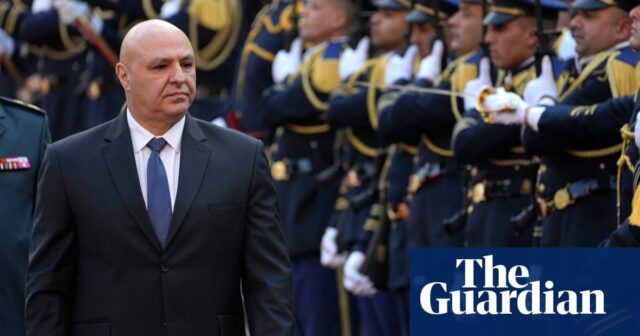Lebanon’s parliament has elected the army commander Joseph Aoun as the country’s new president, ending a more than two-year vacancy and increasing confidence that a ceasefire with Israel will hold.
Aoun received 99 out of 128 votes in the 13th attempt by a deeply divided parliament to elect a new head of state after the departure of the former president Michel Aoun, who is no relation, in October 2022. Aoun was the favoured candidate of international powers such as Saudi Arabia, France and the US, which enjoyed good relations with him in his role as head of Lebanon’s armed forces.
The main task for Aoun is to reassert the role of the Lebanese army, particularly in south Lebanon, where, since the late 1970s, the army’s control has been contested by groups such as the Palestinian Liberation Organisation and Hezbollah.
All armed groups in Lebanon were meant to disarm under a 2004 UN resolution, but Hezbollah retained its arms under the justification that it was the only force that could protect Lebanon from Israel. The Lebanese army has historically been a weak force.
Under the terms of the Israel-Hezbollah ceasefire signed on 27 November, the Lebanese army is to deploy in south Lebanon, while Hezbollah is meant to withdraw, in what politicians and diplomats have styled as the reclaiming of Lebanese state sovereignty.
Michel Helou, the secretary general of the reformist National Bloc party, who has met Aoun several times, said: “The first priority is the ceasefire and the second is dealing with Hezbollah’s weapons. There is no clear way to disarm Hezbollah, but if [Aoun] wants to be remembered he will have to deal with them.”
The presence of a head of state was also seen as necessary to ensure the continuous implementation of the ceasefire agreement. Israeli media had reported in recent weeks that it was considering staying in south Lebanon beyond the 60-day timetable of its withdrawal from Lebanese territory as specified in the deal.
Hezbollah has dominated Lebanese politics for more than two decades, placing its members in cabinet positions and controlling key ministries. The group has been severely battered in 14 months of fighting with Israel, with its secretary general and most of its senior leadership being killed. The loss of its key regional ally, Syria’s former president Bashar al-Assad, who facilitated Iranian weapons transfers across Syria to Lebanon, was another in a series of blows to Hezbollah.
Hezbollah’s preferred candidate for the presidency, Suleiman Frangieh, withdrew on Wednesday afternoon, endorsing Aoun. Hezbollah had repeatedly vetoed all candidates except Frangieh over the last two years.
Hilal Khashan, a professor at the American University of Beirut, said: “Hezbollah today is not what it used to be two years ago … I think that the army will be able to confront Hezbollah, but neither side is interested in confrontation.”
In the days before Thursday’s election, a series of diplomats visited Beirut to hold talks with the main political figures. The French and US envoys to Lebanon, as well as an adviser to the Saudi foreign ministry, visited Beirut in apparent attempts to ensure Lebanese political leaders were genuine in their attempt to elect a president.
The election of Aoun is the first step in ending Lebanon’s international isolation. The country’s 2019 financial meltdown, in which the banking sector collapsed and millions of people’s savings were confiscated by banks, laid bare the political class’s deep corruption. The international community pledged aid to the country – but only after the government made urgent economic and political changes.
The Lebanese MP Alain Aoun said: “This is a sort of reconciliation with the international community and the Gulf countries. This is the real added value of the election of Joseph Aoun – that he brings a translation of this international support.”






